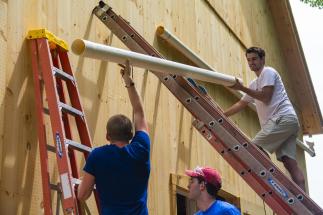A student team from Worcester Polytechnic Institute (WPI) will construct a 1,500-gallon rainwater catchment and irrigation system at a local farm this weekend that will guard against drought, enabling farm leaders to continue to offer key educational programs for area schoolchildren.
The team plans to complete its yearlong project at Turn Back Time Inc., a local nonprofit working to improve children’s lives through nature exploration, farm education, and play. The team will partner with WPI’s student chapter of Engineers Without Borders, a nonprofit humanitarian organization that supports community-driven development programs worldwide through sustainable engineering projects, to build the system on Turn Back Time Inc.’s 58-acre homestead.
Construction will take place May 26–27, from 10 a.m. to 3 p.m., at 250 Marshall St., in Paxton, Mass.
Turn Back Time (TBT) recognized the need for a more climate-resilient watering system during the drought in 2016. TBT’s water source, a nearby pond, dried up to the point that it became unusable. This was detrimental to the farm, as it no longer had water for its crops. Without a healthy garden available, the farm was limited in its educational programs for children, and its function as a whole. As a result, TBT owner Lisa Burris contacted Elisabeth Stoddard, assistant teaching professor in the Environmental and Sustainability Studies program at WPI, for help. Stoddard, who is also the director of the Center for Sustainable Food Systems, designed a student project out of Burris’s needs for the farm, and created a team of four students to conduct interviews and research about how to build a rainwater catchment and irrigation system for the property.
The students—Virginia Adams of Framingham, Mass., Connor Murphy of Middletown, R.I., Cassandra Salafia of Windham, N.H., and Kyle Werra of East Taunton, Mass.— participated in the project as part of their Interactive Qualifying Project (IQP) at WPI. Within the IQP, students work in interdisciplinary teams to solve a problem or need that lies at the intersection of science and society.
The catchment system will be attached to a newly constructed 2,400-square foot barn that houses a 480-square foot classroom, two stalls, a feed room, a compost bathroom, and 1,300 square feet of open space. On rainy days, water will be carried from the gutters attached to the barn into a filtration system, which will filter out leaves, sticks, and other debris. The filtered water will be pumped through an underground pipe beneath a small dirt road, which will be connected to a hose with irrigation drip tape to irrigate the farm’s gardens. The system can also be connected to any other water source on the farm, increasing the farm’s resilience in the face of a drought.
“This has been an incredible opportunity for our students,” Stoddard said. “They have been able to take what they’ve learn about engineering design in the classroom and apply it to a real-world context where natural and human variables require scientists and engineers to be flexible, adaptable, and innovative. It’s also been an incredible opportunity for me to learn about a new area of environmental justice research.”
In addition to the rainwater catchment and irrigation system, Stoddard saw opportunities at TBT for another project team to create science, technology, engineering, and math learning stations for children in the farm’s programs. Enhancing and expanding TBT’s already functioning early childhood education programs was an exciting concept for Burris, who has a master’s certificate in Nature-Based Early Childhood Education from Antioch New England.
WPI students —Locke Bonomo of Corning, N.Y., James O’Connor of Garden City, N.Y., and Justin Silkey of Hubbardston, Mass.— created seven learning stations across the farm’s property. Each station contains educational material for children of different age groups, which ultimately teach visiting children about farming and nature. For example, one station offers the “Jumping A-Log Food Chain,” which helps children build food chains while jumping from log to log in a safe manner. Another station features solar technology, which teaches children how solar energy works, and how it can be harvested to power homes.
“The most inspiring thing about these projects is how excited our farm families get about them,” Burris said. “People love to see the connections we are making in the community, and I think they understand that, ultimately, this makes us a more sustainable program.”
Stoddard says both the watering system and the environmental education stations are parts of a larger discussion on how the act of playing and learning in nature is key to boosting children’s mental, emotional, and physical health.
“Research shows links between a lack of outdoor play in nature and behavioral and emotional issues, such as childhood depression, as well as physical issues, such as childhood obesity,” Stoddard said.
“However,” Burris said, “research also shows that playing outdoors can improve a child’s ability to concentrate, their academic performance, reduce stress and aggression, improve social skills, and reduced the risk of obesity. We have seen all of these benefits demonstrated on our farm.”





